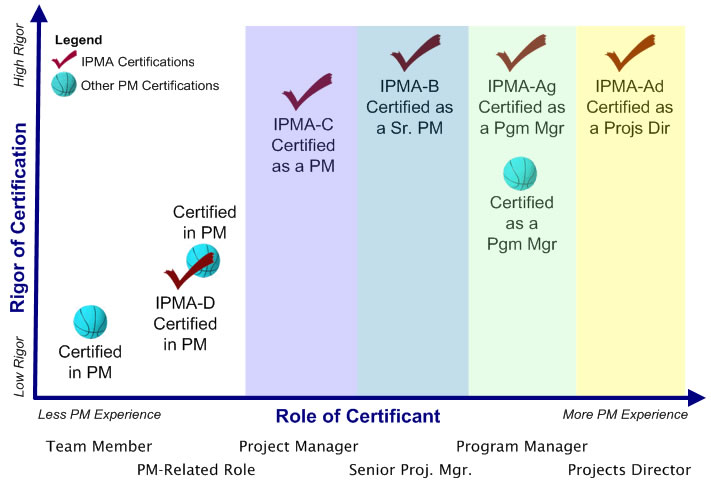Evaluating Role and Rigor: We see a wide range of opinions, analyses, and presentations that fail to clearly show the differences between PM certifications. This is true for Project Management certifications in the USA, and for those around the World. Certifications from IPMA (International Project Management Association) are particularly misunderstood. This may be because they address specific roles and competence-oriented factors that other PM certifications do not. The purpose of this post is to explain the IPMA PM Certifications, and to clarify how they differ from other PM certifications.
Evaluating Role and Rigor: Role Of Certificant
When we speak of Role, we are discussing the primary Role of the certification candidate. Entry-level PM certifications use knowledge-based exams about project management, and do not depend on the PM’s Role. Advanced certifications engage professional assessors in interviews to assess competence in a targeted Role. Some people fill multiple roles; in that case, the Role is the one selected by the candidate as their basis for certification. This is only important in the case of Advanced (higher-Rigor) certifications.
Here is an example of the importance of the Role in Advanced certifications: A candidate may have filled a role of Project Manager and of Senior Project Manager. However, upon reviewing the certification criteria, he or she may determine either a) that their role as Senior Project Manager was not beginning-to-end complete. Or b) that the selected project may not be complex-enough to qualify at a Senior Project Manager’s level. So why is Role Important? Entry-level certifications are targeted to a general project management-related role. IPMA’s Advanced certifications are for the role of Project Manager, or other key PM roles. Because entry-level certifications only assess project management in general, the role is an essential distinction to understand.
Evaluating Role and Rigor: Rigor of Certification
The Rigor of the PM certification is important because high rigor in the process is an indicator of high assurance of PM Competence. Rigor is a multi-variant factor that includes: the prerequisites, the underlying standards, methods of assessment, and re-certification requirements for each certification. Different reviewers may have different opinions about the respective rigor, depending on their experience with PM competence development. For example: an exam based on a 100-page Competence Baseline may appear to be less-rigorous than one based on a 460-page body of knowledge.
A certification based on grasp of a PM competence-improvement foundation (IPMA Individual Competence Baseline) may be more rigorous than a knowledge taxonomy. Some assert that a certification with an ISO 17024 registration is more rigorous than one without it (others say that reflects process, not rigor). And, consider an exam with the majority of score based on open-ended essay questions and exercises. How would you rate the rigor of that to one with the majority of score based on multiple-choice and true/false questions?
Entry-Level Vs. Advanced Certifications
Beyond Entry-level exam-based certifications, Advanced certifications require higher rigor. For example: the Advanced PM certifications offered by IPMA require preparation of a Portfolio of Evidence to demonstrate competence. High Rigor also includes a formal assessment interview, where professional assessors probe performance and verify competence. Even with formal assessment, which would you say is more rigorous: IPMA’s assessment interview with professional assessors, or a questionnaire completed by a dozen peers?
Another dimension to IPMA’s rigor is whether the candidate documents experience in the full range of responsibilities of the role. Has he or she demonstrated evidence of each of the performance criteria required for certification in that role? We mentioned above, the topic of complexity. Each of our Advanced Certifications requires a level of complexity beyond simple projects. Thus, we are unable to certify many of the practitioners who have qualified for other organizations certifications. They lack end-to-end experience with projects even of moderate complexity.
Evaluating Role and Rigor: About The Chart
Given our explanation of the importance of both Role and Rigor in Advanced PM certifications, study the chart above. It shows our analysis of the Roles and Rigor of the IPMA Entry-level and Advanced PM certifications. And it compares them to other certifications that are available. For those who are interested in precision, the center of the ball or check reflects the position of the certification in question on the chart. The Entry-level certifications are in the white-background area, on the left. The role-based Advanced PM certifications are in the colored bands on right.
Our Entry-level certification for PM Associates, IPMA Level-D®, is a strong foundation for competence development. And it is also a very useful certification for Project-related Professions, such as Engineers and Architects. Thus our IPMA Family of member organizations provide an entire range of PM certifications. And, by the way: IPMA created our range of role-based, advanced certifications long before other organizations did so.
Your Choice
We suggest that if you or your team members perform project or program management, you deserve Advanced Certifications. If you merely wish to demonstrate short-term knowledge and establish a basis for further competence development, you have a choice. Begin with ours or others’ Entry level certifications. If projects and programs are key to your organization’s strategy, you should certify Competence (with high rigor) as a PM. Of course, we suggest you use our role-targeted certifications. Which choice will help you the most in your pursuit of improved PM competence and performance? We all need to make the right choices to thrive, given the challenges we continue to face in the World, today and tomorrow.
We encourage you to …

